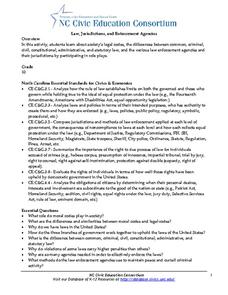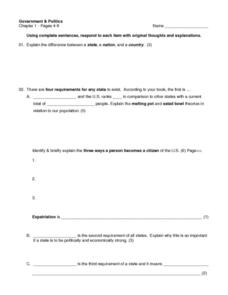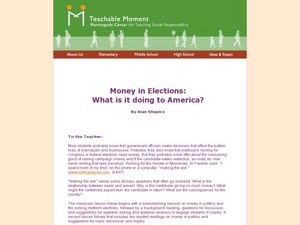Judicial Learning Center
Your 4th Amendment Rights
Americans love to learn about their rights, especially those that protect them from the government's power to invade their privacy. Young people are especially engaged by this topic. An informative lesson explores four Supreme Court...
Historical Thinking Matters
Social Security: 1 Day Lesson
Should the United States provide relief for those who are unemployed? Trace this question back to the Great Depression with your young historians, who will engage in careful reading of historical documents and classroom discussion to...
Learning to Give
Why Volunteer?
Inspire scholars to volunteer their time to make a positive change in their community. With help from research, a public speaker, and reflection, learners define and asses what it takes to be a volunteer in a business, non-profit,...
US Institute of Peace
Responding to Conflict: Mediation
What happens when two parties can't come to agreement? Scholars explore the role of a mediator through part 10 of a 15-part series of peacebuilding lessons. Through individual work and role play, pupils brainstorm solutions until they...
Carolina K-12
Law, Jurisdictions, and Enforcement Agencies
How do you determine what law enforcement agency has jurisdiction when a crime has been committed? That's the challenge facing class members in this role-play activity.
Teaching Tolerance
The True History of Voting Rights
Explore what voting rights really are in an intriguing activity that explores the history of American voting. The resource examines the timeline of voting rights in the United States with group discussions, hands-on-activities, and...
Curated OER
American Studies
Entitled American Studies, this small unit covers various topics related to the study of the United States. Learners warm up by creating a dictionary of democracy, then dive into three different lessons focused on government, famous...
iCivics
Step Five: All about Public Policy
Public policy is important to understand because it affects everyone. The resource tells middle schoolers how the government uses policy to accomplish goals in the administration. It includes a reading, true or false worksheet, a...
Close Up Foundation
Rights Auction
In an engaging activity on universal and unalienable rights, learners work in groups to establish a democratic nation and determine what principles they want to protect to ensure a democratic society. They conduct a "rights auction" in...
Global Oneness Project
The Value of Ancient Traditions
Imagine having to give up cell phones, computers, and TV? What would be lost? What gained? An examination of the Drokpa, a nomadic people who live in the grasslands of Tibet, provides class members an opportunity to consider how access...
Curated OER
Government & Politics: Chapter 1
In this United States history learning exercise, students reference their textbook to answer 18 fill in the blank questions and 8 short answer questions regarding different types of government.
Curated OER
Third Grade Social Studies
In this social studies worksheet, 3rd graders complete multiple choice questions on the Pilgrims, government, economics, and more. Students complete 25 questions.
Curated OER
Introductions to Elections and Government
Eighth graders explore the process of election. In this elections and government lesson, 8th graders complete a K-W-L chart and research the Internet to complete a fact sheet and report on to their peers. This lesson is day two of a two...
Curated OER
3 Branches of Government
Fifth graders explain the process of making and passing laws within Congress by simulating this as a class. They review the three branches of government and focus on the legislative branch for the purposes of creating a bill.
Curated OER
Money in Elections:What is it Doing to America?
Learners investigate the role of money in American elections. In this current events lesson, students read and discuss articles that address money and political campaigns. Learners may conduct further research on the topics presented in...
Curated OER
What Is a Foundation?
Students explore the concept of grants. In this philanthropy lesson, students meet a grant-writer and then collaborate to prepare a grant request.
Curated OER
Role of the Government
Namely through discussion, get your opinionated scholars examining the roles of government- is it even necessary? They analyze the quote: "To be free, one must be chained," writing what it represents and then sharing. Consider...
Curated OER
Planning a Government
Demonstrate the complexities of running a government with this group activity. Young politicians are arranged into small groups and become leaders of a hypothetical country (outline of country provided). Groups must outline 6 (listed)...
Curated OER
Social Studies Review for Grade 5 (5.1)
In this social studies review for grade 5 (5.1) worksheet, 5th graders answer 25 multiple choice questions in a standardized test format about U.S. history.
Curated OER
Executive Government: Ministerial Responsibility
Young scholars are introduced to the principal of ministerial responsibility and identify ways in which ministers account for their actions. In this executive government lesson plan, students roleplay a situation to determine the level...
Curated OER
Eminent Domain: Whose Land is it Anyway?
Students research eminent domain and whether or not there has been a land dispute in their community. Students search local newspapers, local history books or talk with civic leaders and long-time citizens and create a chart showing the...
Curated OER
Third Grade Social Studies- Quiz
In this social studies learning exercise, students complete a 25 question multiple choice quiz about early American colonial life and the Cherokee and other Native American tribes.
Curated OER
This Land Is Your Land
Students explore the many faces of America through the video, "This Land Is Your Land." They discuss places they may have visited and record their responses. Students create symbols that respresent the riches of America.
Curated OER
What Is Government?
Young scholars investigate and describe the various levels of government. They develop a list of the services provided by each level of government, and identify the needs not being met by the government.

























